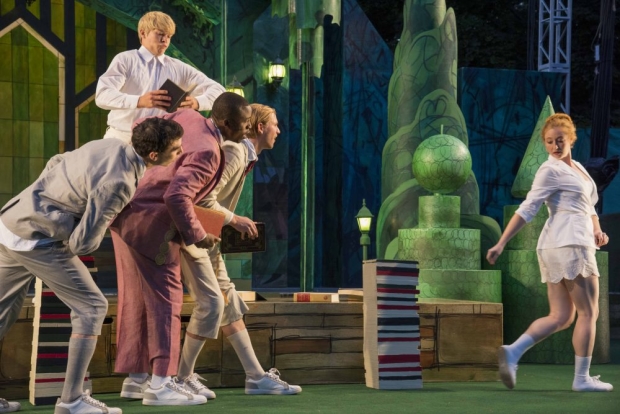Love's Labour's Lost

(© Andrew Brilliant)
Love's Labour's Lost, this year's choice for the annual Shakespearean outdoor production on the Boston Common, could not be better suited to its surroundings. A large audience, seated on chairs or blankets spread out on the vast lawn, was treated to the merriment of love-struck young men behaving foolishly as they're teased by the women they long for.
The conceit that begins the play is a vow between the King of Navarre (Justin Blanchard) and his three comrades, Berowne (Jason Bowen), Longaville (Dalton Davis), and Dumain (Nash Hightower), to study for three years, sleeping only three hours a night, and taking only one meal a day. Above all, they must avoid the company of women. Berowne appeals to the King for easier conditions, but when the others sign their vows, he adds his name.
Conditions change quickly when the Princess of France (Jennifer Ellis) and her retinue arrive on a mission from her father, the King of France. At first they are held off and lodged in tents in a field, but when the men see the lovely women, they fall in love and secretly compose sonnets to them. In counterpoint to the courtiers are a company of clowns: Costard (Larry Coen), Don Armado, a foolish Spanish knight (Remo Airaldi), his servant, Moth (Ray O'Hare), the pompous academic, Holofernes (Fred Sullivan Jr.), the curate, Sir Nathaniel (Mark W. Soucy), and aide to the Princess, Boyet (Brandon Whitehead).
After a pageant of the Nine Worthies, the tone changes dramatically to one of mourning when a messenger arrives bearing news that the King of France has died. In an ending as abrupt as the forsaking of the men's vows, the couples part and the play is over.
The acting ensemble is blessed by the presence of actors familiar to Boston audiences, especially Airaldi as Don Amado in a scene-stealing performance for his imaginative warbling of his emotions; the wide-eyed Coen and haughty Sullivan, both self-important in different ways, and the elegant Ellis as the Princess of France. Blanchard is a welcome addition to the local stage for his well-spoken characterization, while Bowen as Berowne and Obehi Janice as Rosaline spar with wit and humor in a pairing that foreshadows Benedick and Beatrice in the later Much Ado About Nothing.
Under Steven Maler's direction, the language is clearly spoken and paced, while the actors assist in the dancelike scene changes, and enter and leave the platform stage often in a dead run down the long aisle in the center of the audience. The production is decorated by a cut-out palace and a set of topiary trees designed by Scott Bradley. Nancy Leary's costumes add to the light and airy summer vibe of the production. However, given the many added songs and dances, choreographed by Yo-El Cassell, including an amusing, mock-Russian number for the quartet of lovesick swains in disguise, it comes as a surprise that Shakespeare's lyric, "Cuckoo, Cuckoo, cuckoo," was cut at the end, and replaced by his Sonnet 73.
In Love's Labour's Lost, one can sense that Shakespeare was experimenting with themes that he would develop in later plays, and trying out combinations of plots about befuddled lovers, mistaken identity, and humorous characters created to amuse the groundlings — and the rest of us.











